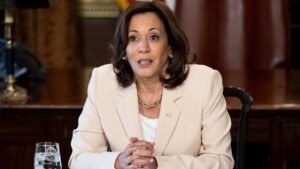U.S. President Donald Trump hosted Jordan’s King Abdullah II at the White House on Tuesday, where the two leaders engaged in a tense discussion about Gaza.
While the meeting was framed as a diplomatic engagement, Trump once again pushed for his controversial vision—handing U.S. control over Gaza, forcibly relocating Palestinians to neighboring countries, and transforming the strip into a “developed” area.
However, rather than taking a firm stance, King Abdullah carefully avoided committing Jordan to anything, deferring the matter to Egypt—a move that has drawn criticism.
Inside the White House Meeting
Sources familiar with the discussion indicate that Trump aggressively reiterated his stance on Gaza, making it clear that he wants regional cooperation to implement his plan.
He floated the idea of using economic leverage, including the potential withholding of aid, to pressure Jordan and Egypt into accepting Palestinian refugees. Trump also attempted to frame his vision as an economic opportunity, suggesting that Gaza could be turned into a thriving coastal hub.
King Abdullah, however, refused to take the bait. While maintaining diplomatic composure, he reiterated Jordan’s longstanding position: the only acceptable resolution to the crisis is a two-state solution.
Rather than directly rejecting Trump’s plan, Abdullah strategically deflected, stating that Jordan would wait for Egypt to present its vision before making any further comments.
This maneuver—seen by some as an attempt to avoid direct confrontation—has not gone unnoticed. Many have criticized Abdullah for shifting responsibility onto Egypt instead of taking a clear stand against Trump’s proposal. While Jordan has been vocal in rejecting forced displacement in the past, this reluctance to challenge Trump outright has raised eyebrows.
At one point in the meeting, Abdullah offered to take in 2,000 sick Palestinian children from Gaza for medical treatment. While this was a humanitarian gesture, Trump quickly spun it as a positive step toward broader regional cooperation—ignoring Jordan’s clear opposition to any mass relocation of Palestinians.
Egypt’s Immediate and Uncompromising Response
Unlike Jordan’s cautious approach, Egypt wasted no time in outright rejecting Trump’s proposal. Within hours of the White House meeting, Egyptian officials reaffirmed their categorical refusal to participate in any plan that involves the forced displacement of Palestinians.
Egyptian sources confirmed that President Abdel Fattah el-Sisi had already communicated Cairo’s position to Washington, warning that any attempt to remove Palestinians from Gaza would be considered a violation of international law and a direct threat to regional stability. Egypt also made it clear that it views the plan as a potential risk to the longstanding peace treaty between Cairo and Tel Aviv.
Further reinforcing its stance, Egypt announced that it would host an emergency Arab League summit on February 27 to discuss developments related to the Palestinian cause. The summit is expected to solidify the region’s collective opposition to any forced displacement and emphasize that a resolution to the Gaza crisis must respect Palestinian sovereignty.
The Proposal at the Center of the Controversy
Though not the main focus of the White House meeting, Trump’s plan remains a major point of contention. His administration has proposed taking over Gaza, relocating its Palestinian population, and repurposing the land for development. The proposal has been widely condemned, with Jordan and Egypt among the most vocal opponents.
While Egypt has taken an unambiguous stand against the plan, Abdullah’s decision to defer the issue to Cairo has sparked debate. Whether this was a strategic diplomatic move or an attempt to avoid directly clashing with Trump remains to be seen. What is clear, however, is that the region is pushing back—and Trump is struggling to secure the support he expected.









What do you think?
It is nice to know your opinion. Leave a comment.